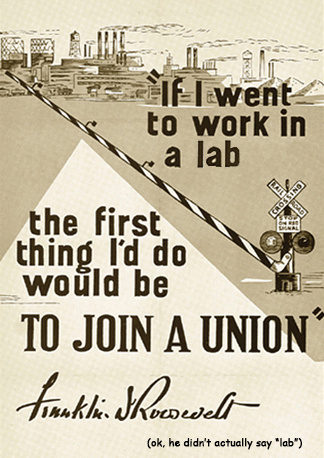Science for the People seeks proposals for articles, art, and other content for a special online issue, “LABor: Academic STEM organizing” (Spring/Summer 2022).
—
As scientists in the academic enterprise, we craft individualized trajectories to “make ourselves.” We immerse ourselves in the power relations of the academy as soon as we embark on our scientific training. This hierarchy, one could argue, stands alone as the singular unifying experience of being an academic in STEM. And just as we are systematically trained as individuals, in the shadows of our mentors, we unconsciously learn to address our grievances by appealing to existing power structures: Who will be the faculty mentor that stands up to my harasser? Which research advisors would supplement my stipend? Which university committee will take steps to make our campus diverse and equitable?
 We in Science for the People, as scientists, activists, writers and editors, believe that it is time to collectively envision and plot out an alternative future for STEM academia that doesn’t rely on existing structures to solve problems inherent to those structures. We have witnessed recent waves of unionization campaigns across the globe, including local efforts that challenge university administrations. History provides us with examples of what unions can accomplish when they build power through rank and file engagement and commit to making radical challenges to the neoliberal order. Global social movements, especially those for economic, racial, and gender equality continue to embolden workers in all industries—to use their labor power as a lever to effect change toward a more just society.
We in Science for the People, as scientists, activists, writers and editors, believe that it is time to collectively envision and plot out an alternative future for STEM academia that doesn’t rely on existing structures to solve problems inherent to those structures. We have witnessed recent waves of unionization campaigns across the globe, including local efforts that challenge university administrations. History provides us with examples of what unions can accomplish when they build power through rank and file engagement and commit to making radical challenges to the neoliberal order. Global social movements, especially those for economic, racial, and gender equality continue to embolden workers in all industries—to use their labor power as a lever to effect change toward a more just society.
For this reason, we are launching a special issue titled “LABor: Academic STEM organizing” with the aim of providing a platform for sharing organizing strategies among academic scientists. While we primarily focus on our experience in the United States, we also seek global perspectives. We are accepting pitches for articles that address topics related to unionization and organizing in STEM academia, including but not limited to the following:
- Critical analysis of current models of university operation and academic STEM training.
- Historiographical accounts of organizing within STEM academia.
- Integrating lab workers’ experiences into academic unions, best practices for organizing in STEM, and imagining a STEM worker strike.
- Building power within an academic department or other scientific groups such as advocacy committees and professional societies (particularly in the absence of a union).
- Organizing STEM academics across universities, departments, job categories.
- Addressing discrimination, harassment, racism, sexism, ableism, etc.
- Confronting broader social issues of policing, militarism, climate change, colonialism, and more.
Submission Guidelines:
Submit proposals here.
Deadline for submissions: January 1 January 15, 2022
- We ask prospective authors to provide a detailed outline.
- We accept proposals for features, opinions, book and media reviews, artwork and more.
- Please keep frameworks under one page and image uploads to 20 Mb total.
- Science for the People articles are geared toward non-specialists, and are written in a journalistic format and from a radical perspective. We consider submissions from scientists across the STEM fields, scholars working in science and technology studies, as well as non-scientists and non-specialists. We especially encourage submissions from activists and those organizing in the sciences, and those working in the humanities and arts at their intersection of science and technology. We particularly welcome women, people of color, non-binary individuals, and others traditionally underrepresented in these fields to send submissions to Science for the People.

